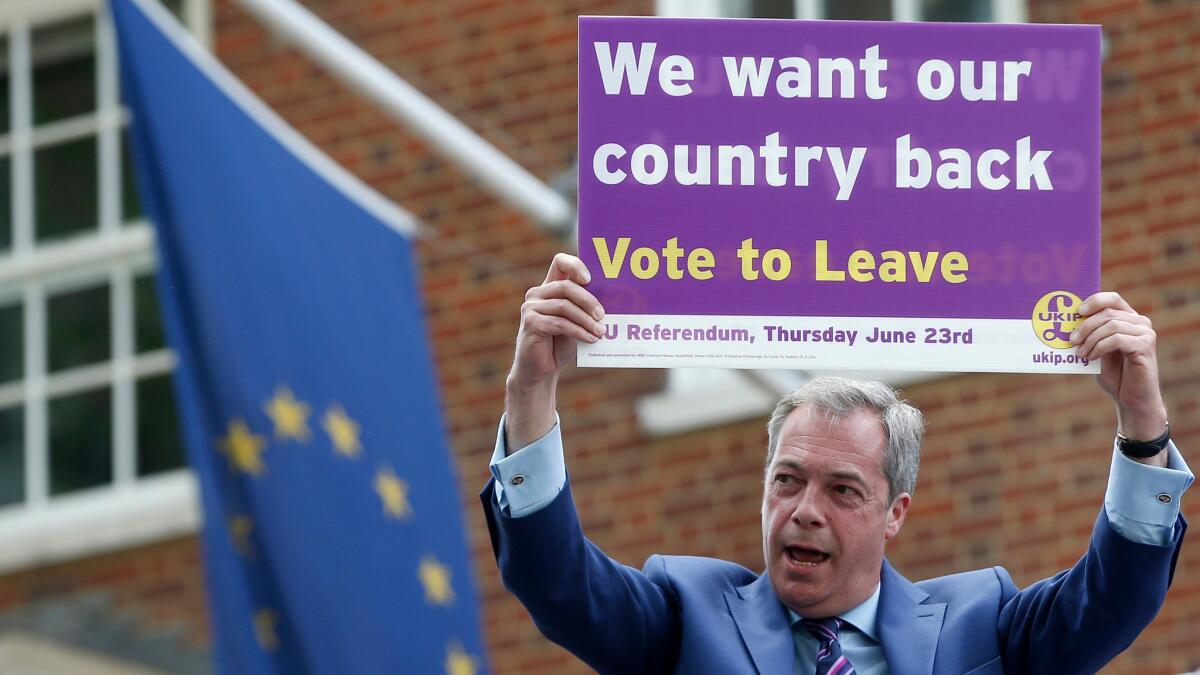Editorial: Brexit’s lesson: Do not underestimate angry voters

- Share via
Britain’s stunning vote Thursday to leave the European Union was part of a dramatic internal struggle over the country’s identity, culture and independence that will transform its role in the world for the foreseeable future. It will undoubtedly cause economic pain for its citizens while likely sparking a fresh Scottish referendum on independence, as well as a possible reassessment within Northern Ireland of its place in the United Kingdom. The “Brexit” vote may turn out to have been a blunder of historic proportions: Instead of affirming Britain’s identity and independence, it could tear the country apart.
The vote also will affect the post-World War II movement toward an ever closer, more integrated Europe – efforts rooted in the belief, after two massive wars, that a unified Europe is a safer Europe. Today, other EU nations are wrestling with many of the same nationalistic and isolationist pressures that won the day in England. In a recent meeting at The Times, the Czech prime minister noted that if there were a referendum held in his country, a very substantial number of voters would opt to leave the EU. A senior French official raised similar concerns at a meeting with the editorial board, and nationalist leaders in France and the Netherlands are already demanding votes in their countries about leaving the EU. Unquestionably, the institution is at risk.
Americans would be wrong to see this as a faraway dispute with no bearing on our own politics. In the United States, demagoguery, populism and the stoking of nationalist fears are also winning hearts and minds – as well as votes for presumptive Republican presidential candidate Donald J. Trump. On Friday, Trump cheered the Brexit vote and seemed to welcome the subsequent collapse in value of the British pound and its impact on tourism (he owns a golf resort in Scotland), oblivious to the fact that the instantly weaker currency threatens U.S. jobs by reducing American exports to an important trading partner.
Trump’s popularity is rooted in anger and frustration – and those emotions are not only felt on the right. A different sort of dissatisfaction – but dissatisfaction nonetheless – propelled Sen. Bernie Sanders’ improbably strong showing in the Democratic race.
Does this reflect a failure of democracy or of politics? Maybe a little of both. Elections are the foundation of a democratic system, and even when voters opt for a path that is contrary to their best interests, they need to be respected. It is through elections that competing visions and, yes, grievances, are mediated. Yet the Brexit vote also points up just how much work needs to be done by those who believe in a society that is pluralistic, pro-free-trade, non-isolationist and pro-immigration. The skeptical need to be persuaded and the disengaged need to be brought into the process.
There are dangerous, demagogic, intolerant currents in American politics today. One lesson of the British vote is not to become complacent, not to assume that voters will eventually come to their senses and opt for the safe, responsible choice. As Trump moves from primary mode into the general election campaign, the message is clear: Don’t underestimate the power of angry voters.
Follow the Opinion section on Twitter @latimesopinion or Facebook
ALSO
Brexit live updates: What’s happening now that Britain voted to leave the EU
U.S. markets drop sharply after ‘Brexit’ vote increases global recession risk
‘Brexit’ means traveling to the U.K. will likely be much cheaper this summer
A cure for the common opinion
Get thought-provoking perspectives with our weekly newsletter.
You may occasionally receive promotional content from the Los Angeles Times.






